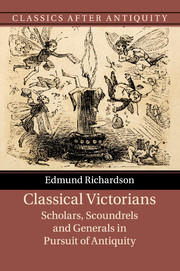
- Publisher:
- Cambridge University Press
- Online publication date:
- February 2013
- Print publication year:
- 2013
- Online ISBN:
- 9781139208598
- Series:
- Classics after Antiquity

Victorian Britain set out to make the ancient world its own. This is the story of how it failed. It is the story of the headmaster who bludgeoned his wife to death, then calmly sat down to his Latin. It is the story of the embittered classical prodigy who turned to gin and opium - and the virtuoso forger who fooled the greatest scholars of the age. It is a history of hope: a general who longed to be an Homeric hero, a bankrupt poet who longed to start a revolution. Victorian classicism was defined by hope - but shaped by uncertainty. Packed with forgotten characters and texts, with the roar of the burlesque-stage and the mud of the battlefield, this book offers a rich insight into nineteenth-century culture and society. It explores just how difficult it is to stake a claim on the past.
'This is a serious and original contribution to our understanding of the Victorian age, fine in nuance, rich in detail; it is also beautifully written, with wit and verve, and a combination of skepticism and - although this is a book on the pursuit of antiquity - high romanticism.'
Richard Jenkyns Source: Common Knowledge
'[An] engagingly written and entertaining study … As soon as I began to read, I was swiftly drawn into Richardson’s narrative and responded enthusiastically to the lives and activities of his characters and themes. I shall dwell on three particular issues among the wealth of fascinating material. First, the book provides a very well informed and thoughtful contribution to the growing body of work on classical reception … Second, I found the section of the book that focuses on the links between military activity and archaeological research particularly rewarding … Last, [this] book raises the relationship between classics and other scholarly fields. Richardson's stimulating and highly readable book is a delight to read. It is also an excellent volume for the first title in what promises to form a significant new series of books that contemplate horizontal classical reception.'
Richard Hingley Source: The Journal of Roman Studies
 Loading metrics...
Loading metrics...
* Views captured on Cambridge Core between #date#. This data will be updated every 24 hours.
Usage data cannot currently be displayed.